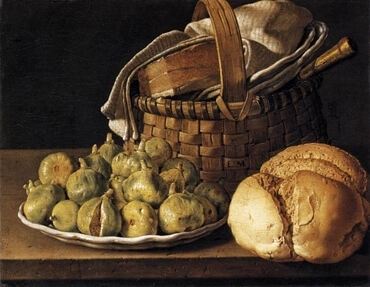1
Trubite u trubu na Sionu! Dižite uzbunu na svetoj mi gori! Neka svi stanovnici zemlje dršću, jer dolazi Jahvin dan. Da, on je blizu.
1
Trubite u trubu na Sionu! Dižite uzbunu na svetoj mi gori! Neka svi stanovnici zemlje dršću, jer dolazi Jahvin dan. Da, on je blizu.

In the Bible, a fig tree represents the "natural", outward life of a person in the world, and the thoughts and feelings directly connected it. Our natural selves have a tendency to be drawn toward evil, seduced by bodily pleasures and engaged in merely factual thinking. If our natural level is connected to a more elevated interior state, though, it can be engaged in doing the work of being good and gathering the knowledge that can be built up into truth. This "natural good" is represented by the figs themselves, the fruit borne by the tree. It's interesting how there is a hierarchy among the most common fruits in the Bible. Olives represent the most exalted human state, which is called "celestial" and is driven by love of the Lord. Grapes represent the next level, which is called "spiritual" and is led by truth from the Lord and love of the neighbor. Figs represent the lowest level, the natural. This makes sense if you think about it. Olives produce olive oil, which is not only food but can also be burned, and fire represents love. Grapes produce wine, which was prized in ancient times and which represents spiritual truth. Figs are food, giving the body energy to work.
9485. 'And they are to make an ark' means the inmost heaven. This is clear from the meaning of 'an ark' as the inmost heaven; for 'the Testimony' or 'the Law' in the ark means the Lord, the reason for this being that 'the Testimony' is Divine Truth, and Divine Truth is the Lord in heaven, see below in 9503. So this then is why 'an ark' means the inmost heaven. The ark was therefore a most holy object, and it was worshipped by the people as Jehovah since Jehovah was thought to dwell there, between the cherubs, as is clear in David,
We heard [of Him] in Ephrathah. We will enter His dwelling-place, we will bow down at His footstool. Arise, O Jehovah, to Your resting-place, You and the ark of Your strength. Psalms 132:6-8.
This refers to the Lord, Ephrathah being Bethlehem, where the Lord was born, Micah 5:2; Matthew 2:6. 'Dwelling-place' means heaven where the Lord is; and 'You and the ark of Your strength' means the Lord and a representative of Him.
[2] The fact that the ark is a representative of the Lord is evident in Jeremiah,
I will bring you back to Zion. In those days they will say no more The ark of the covenant; neither will it come to mind, 1 nor will they make mention of it, nor will they desire it, nor will it be restored any more. At that time they will call Jerusalem the throne of Jehovah, and all the nations will be gathered to it, because of Jehovah's name, to Jerusalem. Jeremiah 3:14, 16-17.
This refers to a new Church. The representative of the former Church, which representative is to be done away with at that time, is meant by 'the ark', which will not be spoken of any more, come to mind, or be restored - 'Jerusalem', to which the nations will be gathered, being that new Church. From this it evident that 'the ark' means a representative of the Lord and the worship of Him in the Church, in the same way as 'the continual [sacrifice]' and 'the dwelling-place of [His] sanctuary' do in Daniel 8:11.
[3] The fact that the ark was worshipped as Jehovah by the Israelite and Jewish people and the fact that He was thought to dwell there, between the cherubs, is evident in the second Book of Samuel,
David caused the ark of God to go up, [the ark] on which His name is invoked - the name of Jehovah Zebaoth, who sits above it on the cherubs. 2 Samuel 6:2.
And in Moses,
Whenever the ark travelled Moses said, Arise, O Jehovah, let Your enemies be scattered, and let those who hate You flee before Your face. Whenever it came to rest he said, Return, O Jehovah, to the myriads of the thousands of Israel. Numbers 10:33-36.
The reason why the inmost heaven was meant by 'the ark' was that all the tabernacle or tent represented the whole angelic heaven, the lowest part of it being represented by the court, the middle part of it by the dwelling-place where the priest ministered, and the inmost by the dwelling-place inside the veil where the ark containing the Testimony was.
Poznámky pod čarou:
1. literally, nor will it come up onto the heart